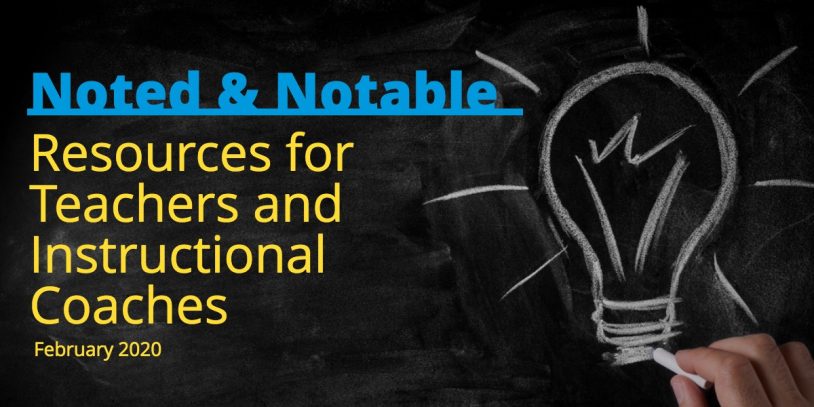Resources for Teachers & Instructional Coaches – February 2020

Valentine’s Day may have just passed, but we pulled together some professional development resources for instructional coaches and teachers that you can (maybe?) love.
Focusing research questions allows teachers to design their own learning experiences
Action research is a model for PD that can empower teachers to set and carry out research questions in their classrooms. It’s a blueprint for schools interested in designing their own innovative professional learning program.
Across grade levels and departments, teachers considered what they wanted to learn about authentic assessment, which the late Grant Wiggins described as engaging, multisensory, feedback-oriented, and grounded in real-world tasks. That’s a contrast to traditional tests and quizzes, which tend to focus on recall rather than application and have little in common with how experts go about their work in disciplines like math or history.
Read more on Edutopia: How Teachers Can Learn Through Action Research
Survey Says… Teachers yearn for coaching, but don’t get enough
Digital Promise surveyed more than 1,000 active teachers about how prevalent they are engaged in coaching. Teachers with regular access to coaches feel more confident. They also reported increased engagement from their students.
A large number of teacher coaches surveyed say they oversee at least 16 teachers, more than the recommended 10 teachers per coach. And while teachers report finding value in receiving biweekly coaching, most see their coaches less frequently and in shorter durations than teachers would like.
Read more on The 74: Teachers Find Coaching Helpful, but Most Don’t Get Enough of It
Developing a team of tech leaders
Choosing the right classroom technology for your district is easier than actually integrating it. The implementation process goes much beyond simply training educators on how to use the technology.
Technology plays an increasingly critical role in K–12 classrooms. From collaboration apps to VR/AR equipment, digital learning tools are making instruction more innovative, engaging and inclusive of all students. It’s no surprise, then, that educators strongly believe in its value.
Yet integrating technology in the classroom comes with its challenges, especially because so many key stakeholders need to be involved. It’s not a job for IT directors, administrators and classroom teachers to handle separately because it requires strategic planning, clear communication and a cohesive vision. Implementing educational technology should be a team effort from the get-go.
Read more on EdTech Magazine: 4 Ways to Develop a Team of Forward-Looking Tech Enthusiasts

